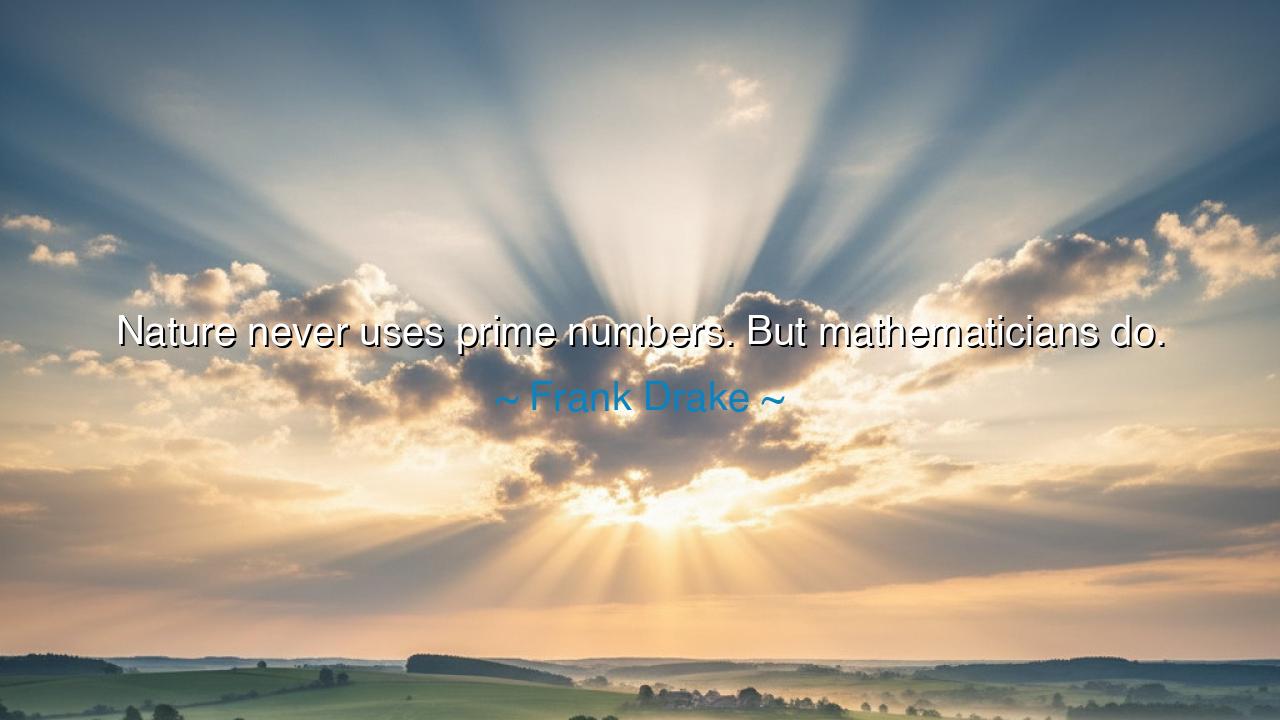
Nature never uses prime numbers. But mathematicians do.






Hear now, O seekers of truth, the voice of Frank Drake, the astronomer who reached with mind and spirit into the cosmic sea, who declared: “Nature never uses prime numbers. But mathematicians do.” These words were not idle, nor a mere play with numbers, but the utterance of one who helped craft the language by which humanity might speak to the stars. Drake, father of the Search for Extraterrestrial Intelligence, understood that in the silence between worlds, only a universal tongue could serve as bridge. And what tongue is more eternal, more incorruptible, than the language of mathematics?
To the ancients, numbers were not mere symbols—they were mysteries, divine harmonies binding the cosmos. The Pythagoreans saw in number the structure of reality, and in the prime numbers the sacred, indivisible seeds of all things. Yet in the patterns of Nature, one finds cycles, ratios, and spirals—the Fibonacci sequence in leaves, the golden ratio in shells, the regularity of orbits and tides. Primes, however, stand apart: lonely, indivisible, beyond pattern. They are not the music Nature commonly plays, but the marks of deliberate thought, of mind imposing structure upon the void.
Thus Drake discerned a profound truth: if one wished to send a signal into the infinite dark, to proclaim, “Here is intelligence, here is mind,” one must use what Nature does not. A pulse of prime numbers, broadcast through the heavens, could never be mistaken for the random whisper of stars or quasars. It would be the unmistakable fingerprint of consciousness. What Nature does not use, mathematicians wield as their torch, revealing presence where otherwise there would only be silence.
Consider the story of the Arecibo Message of 1974. From a great radio telescope in Puerto Rico, humanity sent a coded greeting to the stars, a message written in binary and arranged in a grid of prime number dimensions. Why? Because only intelligent minds would recognize the structure, only they would understand the deliberate order. Thus, our species etched its mark across 25,000 light-years, hoping another mind might one day see the prime-numbered pattern and know: we are here.
The meaning of Drake’s words, then, is twofold. First, they reveal that in Nature, patterns serve function, but primes serve no such purpose—they are outside her ordinary song. Second, they proclaim that human thought is unique in its capacity to find beauty and meaning in what is beyond function. For this reason, primes become not just tools, but banners of intelligence, carriers of our voice across space and time.
The lesson for us is clear: what sets us apart as human beings is not merely that we live in Nature, but that we can transcend her rhythms, finding meaning in what she leaves unused. Just as Drake saw in primes a way to reveal intelligence, so too can we use what seems “useless” to create—art, philosophy, compassion. The greatness of humanity is to see beyond survival, to mark the universe with symbols of mind and spirit.
Practical action flows from this wisdom: let each of us honor the gifts of mathematics, of language, of art—those things that are not strictly necessary to survival, yet reveal our deepest essence. When faced with the silence of indifference, do not despair, but speak your truth boldly, as a pulse of prime numbers in the void. In your own life, find what Nature has not given—kindness in the face of cruelty, hope in the face of despair—and let it be your signal, unmistakable, to all who meet you.
Thus remember Drake’s teaching: “Nature never uses prime numbers. But mathematicians do.” For in primes lies the sign of the thinking spirit, the mark of those who dare to reach beyond what is given. If you take this to heart, your life will not merely follow the cycles of Nature, but rise above them, leaving a signal of your own—a pattern unmistakably human, shining in the dark.






AAdministratorAdministrator
Welcome, honored guests. Please leave a comment, we will respond soon